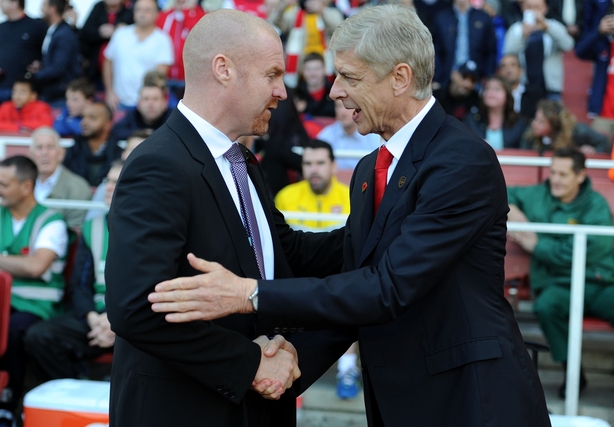As Stephen Kenny looks to instill a playing style shift within the Republic of Ireland team, Burnley manager Sean Dyche has pointed to the example of Arsene Wenger in outlining how challenging evolution will be for his Irish counterpart.
The Clarets boss has a number of Kenny's current and potential playing pool on his books, namely Robbie Brady, Kevin Long and Jimmy Dunne - with Jeff Hendrick eventually joining Newcastle after leaving at the end of June - and speaking on RTÉ 2fm's Game On, Dyche offered his thoughts on the pressures managers like Kenny face in trying to create a more progressive brand of football within a team that had previously played in a more conservative fashion.
"There's a massive demand now to play a certain way. People often tag it 'the right way,'" he said.
"The right way in my experience has always been to win. You've got to find a way of winning.
"Development football and youth football, that's kind of different because the win is not often as important as the players learning the game.
"But when you're at first team level, whether that's international or club level, you've certainly got to win or win enough to be deemed successful.
"I think that challenge has grown over the last ten years, mainly on the back of the Barcelona model.
"A view of it, from my point of view, because we sometimes get mentioned about our style... well, I had, when I used to bump into him, a reasonable relationship with Arsene Wenger and he himself will tell you, people remember Arsenal for the last ten years of his tenure and they forgot the first 12.
"When he took over, they had Steve Bould, Tony Adams, Lee Dixon, Nigel Winterburn - fantastic pros by the way, but not exactly blessed with silky football. They were solid, organised 4-4-2. [Wenger] bought Vieira, he bought Petit, two sitters in midfield, bought two quick wingers and play two up front.

"He had to morph that over a long, long period. It probably wasn't until halfway through his tenure that they looked like the Arsenal we know today.
"So it goes to show you that even a manager of his capabilities and the quality of player he's working with and the finances during those years, it still took him a long time to change styles.
"The challenge for managers now, they're expected to change the style over one pre-season or one change of management. It's simply not that easy.
"I think the balance is there to be found. I think it's tough. Can you play 'the right way' as people like to call it? But you have to win enough or you'll be out of your job."
Aside from the trio that are at the club for the upcoming Premier League season, Dyche has also managed a host of other Irish players at Burnley, including Jonathan Walters and Stephen Ward, and he touched on why footballers from this island have been a key constituency in his time at Turf Moor.
"The Irish players I've had have done well historically," he said.
"There wasn't an exact moment in time where we thought about the fact that they were Irish particularly.
"It was as much a case of good quality players, pricing and players at the right time or age. It wasn't a particular look at the market. It was just good players at the right time and we like that feel of the Irish lads that have been here.
"They are invariably good pros, good people and always in for a bit of craic as well, which we like to work with a smile here. So I do think they fit the way that we work here."
Addressing Hendrick's departure at the end of his contract earlier this summer, Dyche said the reported interest from AC Milan was something he was not aware of.
"It was a paper story, so I don't know any details about that. There was certainly no connection with myself, I can assure you," he said.
"I'm very pleased for Jeff though because we unfortunately couldn't keep him. That was a board and chairman decision and obviously he was a player I did want to keep.
"But he's gone on to a new club, a good club and someone I like a lot in Steve Bruce as well and I wish Jeff all the best."
You can listen to the full interview with Sean Dyche on Game On on RTÉ 2fm from 6pm.

